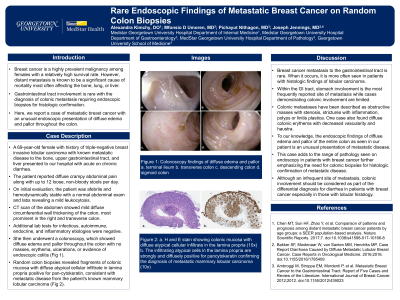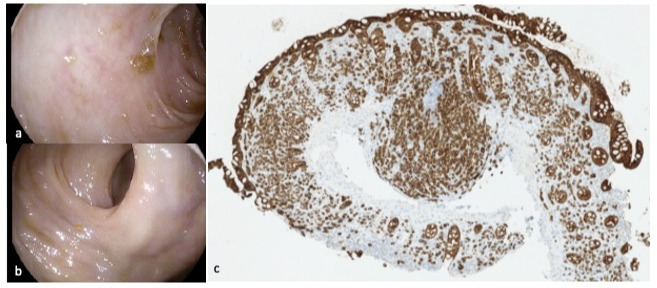Back


Poster Session D - Tuesday Morning
Category: Colon
D0109 - Rare Endoscopic Findings of Metastatic Breast Cancer on Random Colon Biopsies
Tuesday, October 25, 2022
10:00 AM – 12:00 PM ET
Location: Crown Ballroom

Has Audio

Alexandra Kimchy, DO
MedStar Georgetown University Hospital
Washington, DC
Presenting Author(s)
Alexandra Kimchy, DO, Mfonsio Umoren, MD, Pichayut Nithagon, MD, Joseph Jennings, MD
MedStar Georgetown University Hospital, Washington, DC
Introduction: Breast cancer is a highly prevalent malignancy among females with a relatively high survival rate. However, distant metastasis is known to be a significant cause of mortality most often affecting the bone, lung, or liver. Gastrointestinal tract involvement is rare with the diagnosis of colonic metastasis requiring endoscopic biopsies for histologic confirmation. Here, we report a case of metastatic breast cancer with an unusual endoscopic presentation of diffuse edema and pallor throughout the colon.
Case Description/Methods: A 69-year-old female with history of triple-negative breast invasive lobular carcinoma with known metastatic disease to the bone, upper gastrointestinal tract, and liver presented to our hospital with acute on chronic diarrhea. The patient reported diffuse crampy abdominal pain along with up to 12 loose, non-bloody stools per day. On initial evaluation, the patient was afebrile and hemodynamically stable with a normal abdominal exam and labs revealing a mild leukocytosis. CT scan of the abdomen showed mild diffuse circumferential wall thickening of the colon, most prominent in the right and transverse colon. Additional lab tests for infectious, autoimmune, endocrine, and inflammatory etiologies were negative. She then underwent a colonoscopy, which showed diffuse edema and pallor throughout the colon with no masses, erythema, ulcerations, or evidence of endoscopic colitis. Random colon biopsies revealed fragments of colonic mucosa with diffuse atypical cellular infiltrate in lamina propria positive for pan-cytokeratin, consistent with metastatic disease from the patient's known mammary lobular carcinoma.
Discussion: Breast cancer metastasis to the gastrointestinal tract is rare. Colonic metastases have been described as obstructive masses with stenosis, strictures with inflammation, polyps or linitis plastica. One case also found diffuse colonic erythema with decreased vascularity and haustra. Our patient had unusual endoscopic findings of diffuse edema and pallor extending throughout the entire colon. This case adds to the range of pathology seen on endoscopy in patients with breast cancer further emphasizing the need for colonic biopsies for histologic confirmation of metastatic disease. Although an infrequent site of metastasis, colonic involvement should be considered as part of the differential diagnosis for diarrhea in patients with breast cancer especially in those with lobular histology.

Disclosures:
Alexandra Kimchy, DO, Mfonsio Umoren, MD, Pichayut Nithagon, MD, Joseph Jennings, MD. D0109 - Rare Endoscopic Findings of Metastatic Breast Cancer on Random Colon Biopsies, ACG 2022 Annual Scientific Meeting Abstracts. Charlotte, NC: American College of Gastroenterology.
MedStar Georgetown University Hospital, Washington, DC
Introduction: Breast cancer is a highly prevalent malignancy among females with a relatively high survival rate. However, distant metastasis is known to be a significant cause of mortality most often affecting the bone, lung, or liver. Gastrointestinal tract involvement is rare with the diagnosis of colonic metastasis requiring endoscopic biopsies for histologic confirmation. Here, we report a case of metastatic breast cancer with an unusual endoscopic presentation of diffuse edema and pallor throughout the colon.
Case Description/Methods: A 69-year-old female with history of triple-negative breast invasive lobular carcinoma with known metastatic disease to the bone, upper gastrointestinal tract, and liver presented to our hospital with acute on chronic diarrhea. The patient reported diffuse crampy abdominal pain along with up to 12 loose, non-bloody stools per day. On initial evaluation, the patient was afebrile and hemodynamically stable with a normal abdominal exam and labs revealing a mild leukocytosis. CT scan of the abdomen showed mild diffuse circumferential wall thickening of the colon, most prominent in the right and transverse colon. Additional lab tests for infectious, autoimmune, endocrine, and inflammatory etiologies were negative. She then underwent a colonoscopy, which showed diffuse edema and pallor throughout the colon with no masses, erythema, ulcerations, or evidence of endoscopic colitis. Random colon biopsies revealed fragments of colonic mucosa with diffuse atypical cellular infiltrate in lamina propria positive for pan-cytokeratin, consistent with metastatic disease from the patient's known mammary lobular carcinoma.
Discussion: Breast cancer metastasis to the gastrointestinal tract is rare. Colonic metastases have been described as obstructive masses with stenosis, strictures with inflammation, polyps or linitis plastica. One case also found diffuse colonic erythema with decreased vascularity and haustra. Our patient had unusual endoscopic findings of diffuse edema and pallor extending throughout the entire colon. This case adds to the range of pathology seen on endoscopy in patients with breast cancer further emphasizing the need for colonic biopsies for histologic confirmation of metastatic disease. Although an infrequent site of metastasis, colonic involvement should be considered as part of the differential diagnosis for diarrhea in patients with breast cancer especially in those with lobular histology.

Figure: Figure 1: Colonoscopy findings of diffuse edema and pallor of the (a) descending colon (b) sigmoid colon. (c) The infiltrating atypical cells in the lamina propria are strongly and diffusely positive for pancytokeratin confirming the diagnosis of metastatic mammary lobular carcinoma (10x).
Disclosures:
Alexandra Kimchy indicated no relevant financial relationships.
Mfonsio Umoren indicated no relevant financial relationships.
Pichayut Nithagon indicated no relevant financial relationships.
Joseph Jennings indicated no relevant financial relationships.
Alexandra Kimchy, DO, Mfonsio Umoren, MD, Pichayut Nithagon, MD, Joseph Jennings, MD. D0109 - Rare Endoscopic Findings of Metastatic Breast Cancer on Random Colon Biopsies, ACG 2022 Annual Scientific Meeting Abstracts. Charlotte, NC: American College of Gastroenterology.
